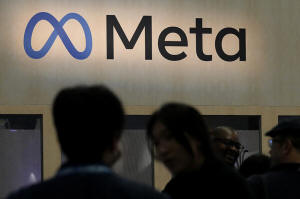Which US companies are pulling back on diversity initiatives?
 Send a link to a friend
Send a link to a friend
 [January 11, 2025] Facebook and Instagram parent company Meta Platforms Inc. joins a
growing list of companies that are pulling back on diversity, equity and
inclusion initiatives. [January 11, 2025] Facebook and Instagram parent company Meta Platforms Inc. joins a
growing list of companies that are pulling back on diversity, equity and
inclusion initiatives.
Like others before it, the social media giant cited a U.S. Supreme Court
decision in July 2023 that outlawed affirmative action in college
admissions.
Conservative activists have gone after companies — both in the courts
and on social media — seeking to set a similar precedent in the working
world. They’ve been targeting workplace initiatives such as diversity
programs and hiring practices that prioritize historically marginalized
groups, and have widened their objections to include programs focused on
gender identity and sexual orientation.
DEI policies typically are intended as a counterweight to discriminatory
practices. Critics argue that education, government and business
programs which single out participants based on factors such as race,
gender and sexual orientation are unfair and the same opportunities
should be afforded to everyone.
Joel Kaplan, Meta's freshly appointed global policy chief, told Fox News
Digital on Friday that the move will ensure that the company is
“building teams with the most talented people” instead of making hiring
decisions based on protected characteristics.
“This is ultimately about doing what’s best for our company and ensuring
that we are serving everyone and building teams with the most talented
people,” Kaplan told Fox News Digital. “This means evaluating people as
individuals, and sourcing people from a range of candidate pools, but
never making hiring decisions based on protected characteristics like
race or gender.”

Here's a look at some of the other companies that have retreated from
DEI:
McDonald's
Four years after launching a push for more diversity in its ranks,
McDonald’s said earlier this month that it is ending some of its
diversity practices, citing a U.S. Supreme Court decision that outlawed
affirmative action in college admissions.
McDonald’s said on Jan. 6 that it will retire specific goals for
achieving diversity at senior leadership levels. It also intends to end
a program that encourages its suppliers to develop diversity training
and to increase the number of minority group members represented within
their own leadership ranks.
McDonald’s said it will also pause “external surveys.” The burger giant
didn’t elaborate, but several other companies have suspended their
participation in an annual survey by the Human Rights Campaign that
measures workplace inclusion for LGBTQ+ employees.
Walmart
The world’s largest retailer confirmed in November that it would not be
renewing a five-year commitment for an equity racial center set up in
2020 after the police killing of George Floyd, and that it would stop
participating in the HRC's Corporate Equality Index.
Walmart also said it will better monitor its third-party marketplace to
make sure items sold there do not include products aimed at LGBTQ+
minors, including chest binders intended for transgender youth.
Additionally, the company will no longer consider race and gender as a
litmus test to improve diversity when it offers supplier contracts and
it won’t be gathering demographic data when determining financing
eligibility for those grants.
[to top of second column] |

Attendees visit the Meta booth at the Game Developers Conference in
San Francisco on March 22, 2023. (AP Photo/Jeff Chiu, File)
 Ford
CEO Jim Farley sent a memo to the automaker's employees in August
outlining changes to the company's DEI policies, including a
decision to stop taking part in HRC's Corporate Equality Index.
Ford, he wrote, had been looking at its policies for a year. The
company doesn’t use hiring quotas or tie compensation to specific
diversity goals but remained committed to “fostering a safe and
inclusive workplace,” Farley said.
“We will continue to put our effort and resources into taking care
of our customers, our team, and our communities versus publicly
commenting on the many polarizing issues of the day,” the memo said.
Lowe's
In August, Lowe's executive leadership said the company began
“reviewing” its programs following the Supreme Court’s affirmative
action ruling and decided to combine its employee resource groups
into one umbrella organization. Previously, the company had
“individual groups representing diverse sections of our associate
population.”
The retailer also will no longer participate in the HRC index, and
will stop sponsoring and participating in events, such as festivals
and parades, that are outside of its business areas.
John Deere
The farm equipment maker said in July that it will no longer sponsor
“social or cultural awareness” events, and that it would audit all
training materials “to ensure the absence of socially-motivated
messages” in compliance with federal and local laws.
Moline, Illinois-based John Deere added “the existence of diversity
quotas and pronoun identification have never been and are not
company policy.” But it noted that it would still continue to “track
and advance” the diversity of the company.
Tractor Supply
The retailer in June said it was ending an array of corporate
diversity and climate efforts, a move that came after weeks of
online conservative backlash against the rural retailer.
Tractor Supply said it would be eliminating all of its DEI roles
while retiring current DEI goals. The company added that it would
“stop sponsoring non-business activities” such as Pride festivals or
voting campaigns — and no longer submit data for the HRC index.
The Brentwood, Tennessee-based company, which sells products ranging
from farming equipment to pet supplies, also said that it would
withdraw from its carbon emission goals to instead “focus on our
land and water conservation efforts.”
The National Black Farmers Association called on Tractor Supply’s
president and CEO to step down shortly after the company's
announcement.
All contents © copyright 2024 Associated Press. All rights reserved
 |